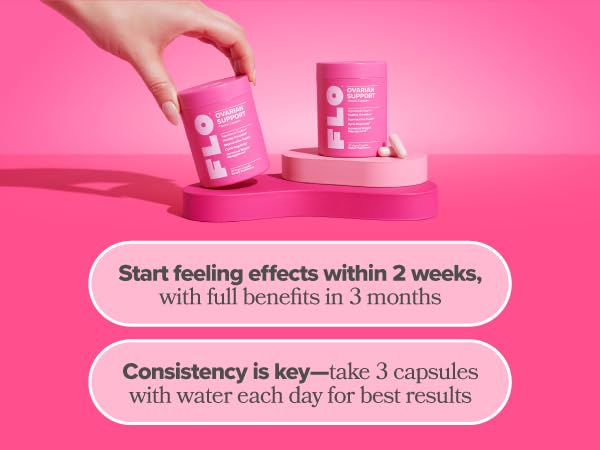When it comes to women’s health, managing hormonal balance and reproductive health is a top priority. One supplement that has been generating considerable buzz is FLO Ovarian Support. This dietary supplement promises to address key issues related to ovulation, hormone regulation, and overall reproductive well-being. But is it worth the investment? In this article, I’ll break down the components, benefits, and trade-offs associated with FLO Ovarian Support, providing a clear and objective analysis for anyone considering adding it to their routine.
What is FLO Ovarian Support?
FLO Ovarian Support is a dietary supplement developed by O Positiv Health. It’s specifically formulated to support healthy ovulation, regular menstrual cycles, and hormone balance. Each serving consists of three capsules containing a blend of key ingredients: Folic Acid, Myo-Inositol, D-Chiro-Inositol, and Diindolylmethane (DIM). The company recommends consistent use for at least three months to experience the full benefits.
Key Health Claims:
O Positive Health markets this supplement as a solution for:
- Healthy ovulation
- Reproductive health
- Cycle regularity
- Hormonal weight management
Let’s explore the ingredients and their potential impact.
Breakdown of FLO Ovarian Support Ingredients
1. Folic Acid (680 mcg DFE)
Folic acid, the synthetic form of folate (Vitamin B9), is crucial for reproductive health. It is widely known for its role in preventing neural tube defects during pregnancy. Recent studies link folate intake with improved fertility and reduced risk of ovulatory infertility.
Key Benefits:
- Supports healthy ovulation
- Enhances fertility outcomes
- Essential for fetal development
Considerations:
The supplement provides 680 mcg, exceeding the 400 mcg daily recommendation for adult women. While generally safe, individuals with the MTHFR gene variation may not absorb folic acid efficiently. Consulting a healthcare provider is essential to determine if this form of folate is right for you.
2. Myo-Inositol (2000 mg) and D-Chiro-Inositol (50 mg)
These two forms of inositol play a critical role in managing Polycystic Ovary Syndrome (PCOS) and other hormonal imbalances. The 40:1 ratio of Myo-Inositol to D-Chiro-Inositol in FLO Ovarian Support mirrors the natural ratio found in the human body.
Key Benefits:
- Improves insulin sensitivity and glucose levels
- Reduces testosterone levels (helpful for hirsutism)
- Promotes regular menstrual cycles and ovulation
- Enhances fertility and egg quality
Trade-Offs:
While the dosage falls within recommended ranges, some individuals may require higher amounts, especially for managing severe symptoms. Personalized dosage adjustments might be necessary based on individual health needs.
3. Diindolylmethane (DIM) – 100 mg
DIM is a compound derived from cruciferous vegetables such as broccoli and kale. It supports estrogen metabolism and detoxification.
Key Benefits:
- Balances estrogen levels
- Reduces PMS symptoms and supports regular cycles
- May aid in weight management linked to hormonal imbalance
Challenges:
Research on DIM remains limited, and the supplement uses a generic crystalline form rather than the more absorbable BioResponse-DIM (BR-DIM). This could affect its efficacy. Dosage consistency is another factor; while 100 mg is within the standard range, some individuals may require a higher dose for noticeable results.
Pros and Cons of FLO Ovarian Support
Pros:
- Third-Party Tested: Ensures product purity and quality.
- Effective Inositol Ratio: The 40:1 ratio aligns with clinical recommendations.
- Vegan-Friendly: Suitable for various dietary preferences.
- Money-Back Guarantee: A 60-day risk-free trial period.
- Convenient Subscription Options: Offers discounts and regular deliveries.
Cons:
- Capsule Dosage: Three capsules per serving may be cumbersome for some.
- Cost: Higher price point compared to purchasing ingredients individually.
- Folic Acid Form: Not ideal for those with MTHFR mutations.
- Lower-End Dosage: Some ingredients might be insufficient for certain conditions.
- Limited DIM Absorption: The generic form may reduce effectiveness.
Trade-Offs and Considerations
Balancing the pros and cons of FLO Ovarian Support requires a thoughtful approach. While the supplement offers a convenient blend of essential nutrients, it may not suit everyone. The cost is a significant factor, especially considering that similar ingredients are available individually at lower prices. Additionally, the dosage might be too low for some users, particularly those managing severe hormonal imbalances or PCOS.
On the other hand, third-party testing and vegan-friendly formulation provide peace of mind regarding quality and ethical considerations. The inclusion of Inositol with an optimal ratio is a definite advantage, especially for those focusing on insulin sensitivity and menstrual regularity.
Is FLO Ovarian Support Worth It?
Determining whether FLO Ovarian Support is the right choice depends on individual health needs and goals. If you require a specific blend of Folic Acid, Inositol, and DIM and prefer the convenience of a single supplement, it may be a valuable addition to your routine. However, if cost or specific ingredient dosages are concerns, purchasing these nutrients separately could be a more economical option.
Consult a Healthcare Provider:
Before starting any new supplement, it’s crucial to consult a healthcare professional. They can help assess your individual needs, avoid nutrient overlaps, and ensure that the supplement is safe for your specific health profile.
Final Thoughts
FLO Ovarian Support offers a promising approach to managing hormonal health and supporting reproductive function. While it presents several advantages, the trade-offs in cost and ingredient forms should not be overlooked. By weighing these factors carefully, you can make an informed decision that best aligns with your health priorities.
